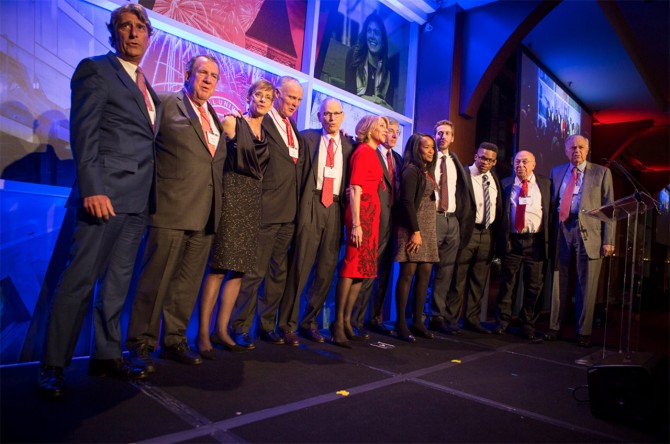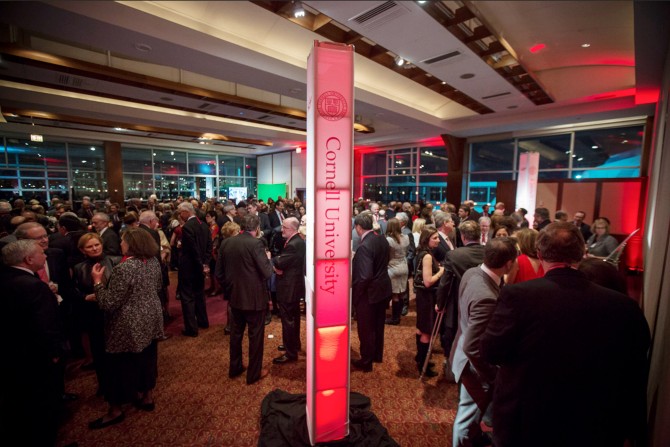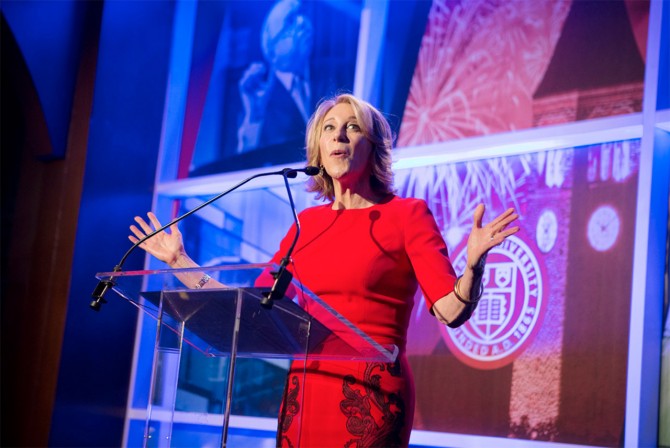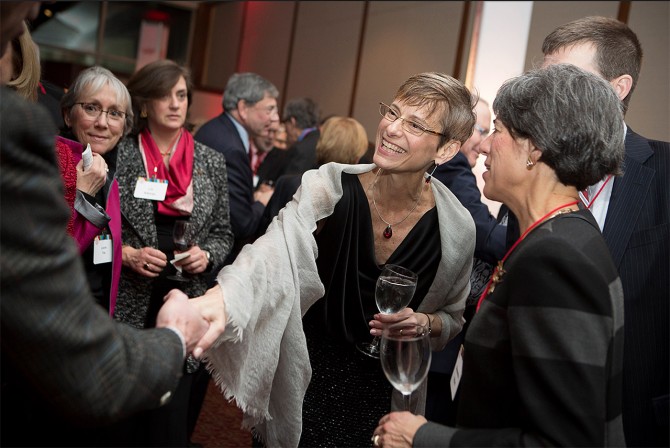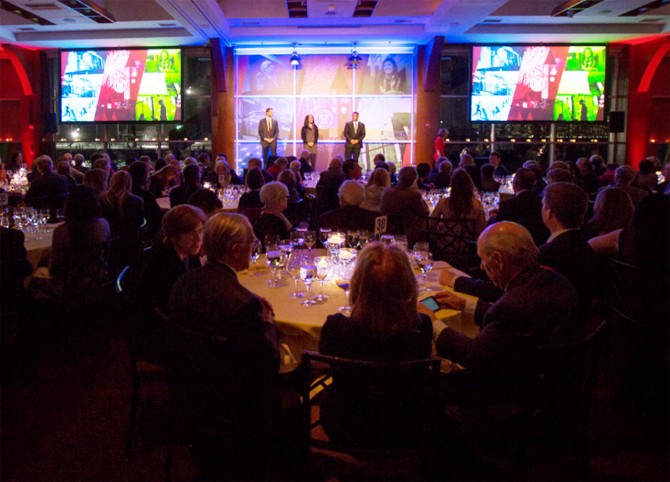NYC event celebrates goal-shattering success of campaign
By Jose Beduya
It was a celebration more than a decade in the making. Led by President Elizabeth Garrett, a crowd 500-strong gathered Jan. 29 at Pier Sixty, Chelsea Piers, in New York City to mark the triumphant completion of Cornell University’s multibillion-dollar capital campaign.
Initiated in 2004 and launched as Far Above in 2006, and later re-envisioned as Cornell Now, the campaign ended Dec. 31, 2015, with $6.36 billion raised for universitywide priorities, surpassing its expanded $5.75 billion goal. It has boosted financial aid for students, strengthened and renewed the faculty, and created and upgraded state-of-the-art facilities. It has also established transformative programs like Engaged Cornell and the Tata-Cornell Agriculture and Nutrition Initiative, and paved the way for cross-campus advancements, including the Meinig School of Biomedical Engineering and the Atkinson Center for a Sustainable Future in Ithaca, the Meyer Cancer Center at Weill Cornell Medicine, and Cornell Tech’s Jacobs Technion-Cornell Institute in New York City.
“Thank you and congratulations, Cornellians!” Garrett said to a cheering crowd that included the campaign’s most devoted leaders and donors, from its silent phase through the fanfare and festivities of 2015, Cornell’s sesquicentennial year and a banner year for gifts to the university.
Garrett also shared breaking news of a $50 million gift commitment from Robert F. Smith ’85 that will build the representation of African-Americans and women in engineering, support the School of Chemical and Biomolecular Engineering, and create a fellowship program that will offer select undergraduates, particularly African-Americans and women, who matriculate in the College of Engineering a pathway to Cornell Tech. The gift is “stunning proof of our momentum coming out of the campaign and promise going forward,” Garrett said.
Describing the start of her tenure as the “home stretch” of the campaign, Garrett paid tribute to her predecessor David Skorton, sesquicentennial co-chairs Nancy Meinig ’62 and Peter Meinig ’61, and campaign co-chairs Robert Appel ’53, Stephen Ashley ’62, MBA ’64, Andrew Tisch ’71 and Jan Rock Zubrow ’77.
“It’s a great time to be a Cornellian,” Ashley said. “Something electric happens when you get two or more Cornelians working together. It just brings about the best in us – our creativity, energy and forward thinking.”
Zubrow, who emceed the evening, described the campaign’s success as “a testament to the love and confidence that our alumni have for Cornell.”
“The campaign was supported by more than 175,000 donors, and it has touched virtually every part of the university,” she said.
Student financial aid is one area of tremendous impact, with $388 million raised for undergraduate scholarships (including targeted support for international students); 674 new named endowed scholarships; and $350 million that benefited graduate students, bolstered by 198 named graduate fellowships and professional school scholarships.
Cornell’s faculty was also boosted by the campaign. Ninety new endowed professorships and 76 named sesquicentennial faculty fellowships were created, and the Tisch University Professorships were established to allow the president and provost to recruit and retain outstanding faculty in strategic academic areas.
With $1.1 billion raised for facilities, the campaign has also built landmarks for teaching and research, including Gates Hall and Klarman Hall in Ithaca and the Belfer Research Building at Weill Cornell Medicine, among others. Renovation projects also include the University Health Services Building on the Ithaca campus.
Garrett praised these and other fundraising milestones and said the campaign’s impact will continue to be felt in ways impossible to quantify: “Fundamentally, it’s about how many lives are changed for the better through Cornell’s mission of education, discovery, public engagement and creativity.”
Garrett challenged Cornellians to continue the momentum created by the campaign and outlined three university priorities: recruiting and retaining world-class faculty; enhancing the vitality and meaning of a Cornell education through support of financial aid and programs that enhance student learning and engagement; and strengthening connections and collaborations across the Ithaca campus, Cornell Tech and Weill Cornell Medicine.
Fred Van Sickle, who assumed his post as vice president for alumni affairs and development Jan. 18, was thrilled to attend the event. “I’m truly inspired to be among spirited and committed supporters and to experience this shining, pivotal moment as part of the Cornell community,” he said.
He added: “Cornellians have risen to the challenge of the past decade to strengthen what they love the most about Cornell, and I believe they will champion the university time and time again.”
Jose Beduya is a writer for Alumni Affairs and Development.
Media Contact
Get Cornell news delivered right to your inbox.
Subscribe